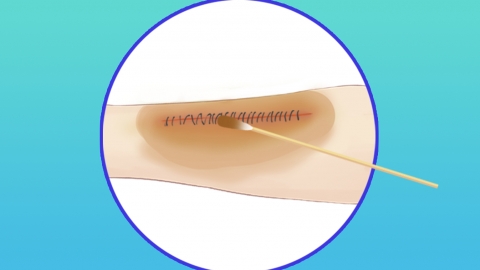Why can't povidone-iodine be used on broken skin?
Generally speaking, there is no rule that povidone-iodine cannot be used on broken skin. In most cases, povidone-iodine can be used to disinfect broken skin areas. However, under certain circumstances such as iodine allergy, deep wounds, wounds contaminated with corrosive substances, wounds located in special areas, or wounds requiring observation of color changes, it is not recommended to apply povidone-iodine directly on the wound. If in doubt, it is advisable to seek medical advice in advance. Detailed explanations are as follows:

1. Iodine allergy: If a patient has an allergic constitution or is allergic to iodine in povidone-iodine, it should not be used. Application of povidone-iodine may cause symptoms such as skin itching, redness, swelling, hives, and in severe cases, serious allergic reactions like laryngeal edema, which can hinder wound healing.
2. Deep wounds: For deep wounds, applying povidone-iodine may not effectively reach deeper tissue layers, resulting in inadequate disinfection. In such cases, patients should seek timely medical attention. Under a doctor's guidance, the wound should be irrigated with solutions such as sodium hydroxide solution or normal saline, and medications like Cefotaxime Sodium and Sulbactam Sodium for injection, Levofloxacin Tablets, or Amoxicillin Granules may be prescribed to prevent infection.
3. Wounds contaminated with corrosive substances: If the wound has been contaminated with strongly irritating liquids such as strong acids or alkalis, disinfection with povidone-iodine is not recommended. Although povidone-iodine is a commonly used antiseptic, it also has certain irritant properties. Using it in this situation may cause further damage to the affected area, worsening the condition.
4. Wounds in specific locations: For wounds located on mucous membranes such as oral mucosa, vaginal mucosa, and anal mucosa, povidone-iodine should be avoided. These areas contain numerous capillaries and nerve endings; direct contact with povidone-iodine could cause significant pain and result in poor therapeutic effects.
5. Wounds requiring observation of color changes: For wounds where color changes need to be observed, such as sites for penicillin or rabies vaccine skin tests, povidone-iodine should not be used. The color of povidone-iodine may interfere with accurate observation, affecting the reliability of the test results.
Therefore, before using any disinfectant, it is recommended to conduct a small-scale sensitivity test first to ensure safety.




